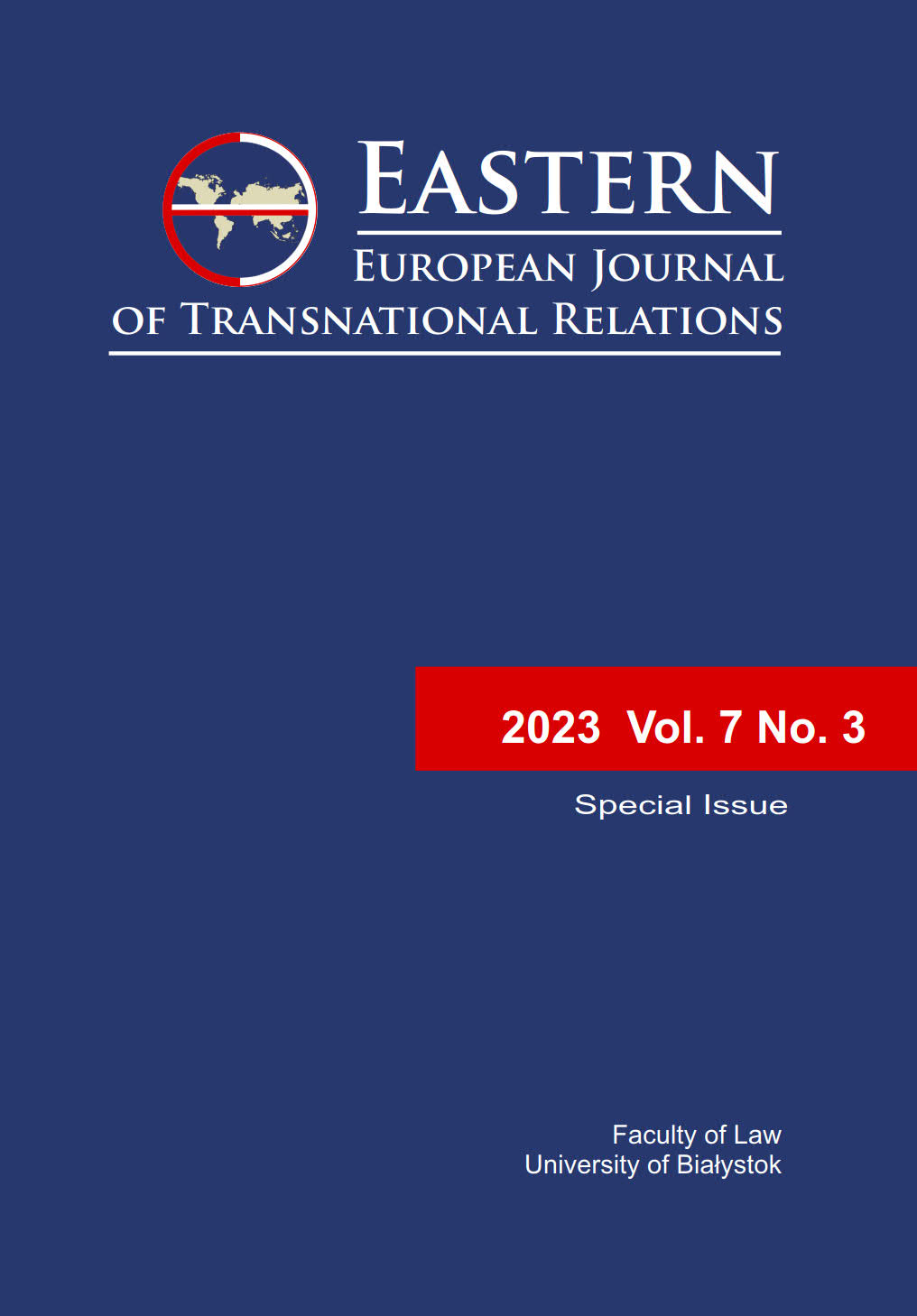The Impact of Art. 25 of the European Social Charter on the Protection of Claims of Employees in the Event of the Insolvency of Their Employer in the Polish Law
DOI:
https://doi.org/10.15290/eejtr.2023.07.03.07Słowa kluczowe:
European Social Charter, Guaranteed Employee Benefits Fund, employer's insolvency, protection of employee claims, compensation for workAbstrakt
The purpose of this article is to assess whether Poland could, at present, ratify and become legally bound by Article 25 of the European Social Charter. The question remains all the more pertinent in view of the reference to the content of the Charter in the European Court of Human Rights judicial practice, even in case of the States that have not accepted a particular part of the Charter. The aforementioned provision requires that the State, as a signatory to an international agreement, establish a public institution responsible for ensuring that employees receive their benefits for a specified period when, due to objective reasons such as bankruptcy, liquidation, or an industry crisis, their employer cannot make these payments. This responsibility of the public authority is essential for upholding the sustenance role of wage compensation and alleviating the impact of job loss due to economic factors. The article describes the current state of the law, the institution of the Guaranteed Employee Benefits Fund, along with the way it is financed, emphasizing the unique definitions of 'employee' and 'employer' and the concept of insolvency within the reviewed legislation. Equally important is highlighting the international and European legal sources that bind the Republic of Poland, which influenced the legislator in developing the components of the social security system.
Pobrania
Bibliografia
Antonów, K., Baran, K., Dörre-Kolasa, D., Lewandowicz-Machnikowska, M., Sierocka, I., Walczak, K., & Włodarczyk, M. (2022). Prawo Pracy i Ubezpieczeń Społecznych. Wolters Kluwer,
Duda, M. (2014). Art. 29. In H. Dzwonkowski & G. Gołębiowski (eds.), Ustawa o finansach publicznych. Komentarz prawno-finansowy. Wydawnictwo Sejmowe.
Gersdorf, M. (2002). Niewypłacalność pracodawcy w prawie pracy. Fundusz Gwarantowanych Świadczeń Pracowniczych jako instytucja ochrony roszczeń pracownika. Lexis Nexis.
Góral, Z., & Nowak, M. (2014). Wynagrodzenie za pracę. Wolters Kluwer Polska.
Grabowska, A. (2017). Ochrona roszczeń pracowniczych w fazie faktycznej niewypłacalności pracodawcy. Pracownik i Pracodawca, 3(1), 62-73. http://dx.doi.org/10.12775/PiP.2017.006.
Grygutis, J. (2017). Zadania samorządu województwa związane z zaspokajaniem roszczeń pracowniczych związane z zaspokajaniem roszczeń pracowniczych z tytułu niewypłacalności pracodawcy. Rocznik Samorządowy, 6, 94-110.
Kordasiewicz, P. (2000). Podmiotowy zakres ochrony pracowników przed niewypłacalnością pracodawcy (Uregulowanie polskie na tle standardów międzynarodowych). Państwo i Prawo, 3, 70-78.
Kosikowski, C., & Ruśkowski, E. (eds.) (2006). Finanse publiczne i prawo finansowe. Wolters Kluwer.
Latos-Miłkowska, M. (2018). Ochrona roszczeń pracowniczych w razie niewypłacalności pracodawcy. Komentarz. Wolters Kluwer.
Latos-Miłkowska, M. (2019). Status prawny uczelni w świetle ustawy o ochronie roszczeń pracowniczych w razie niewypłacalności pracodawcy. Praca i Zabezpieczenie Społeczne, 8, 28-33.
Liskowski, M. (2019). Pojęcie niewypłacalności pracodawcy w ustawie o ochronie roszczeń pracowniczych w razie niewypłacalności pracodawcy. Studia Iuridica Toruniensia, 22, 169–188.
Nawacki, L., Szałek, A., & Wujczyk, M. (2016). Europejska Karta Społeczna: wyzwania i szanse. 25 lecie członkostwa Polski w Radzie Europy. Wydawnictwo Biura Rzecznika Praw Obywatelskich.
Pietrzela, J., & Rudnik, K. (2019). Wybrane aspekty praktyczne postępowań restrukturyzacyjnych i upadłościowych prowadzonych wobec podmiotów prowadzących gospodarstwa rolne. Doradca Restrukturyzacyjny, 16(2), 69-78.
Suchanowska, J. (2013). Ustawa o ochronie roszczeń pracowniczych w razie niewypłacalności pracodawcy. Komentarz. Lexis Nexis.
Świątkowski, A.M., & Wujczyk, M. (2016). Karta Praw Społecznych Rady Europy jako szansa ustanowienia jednolitej koncepcji obywatelstwa Unii Europejskiej. Roczniki Administracji i Prawa, 16(2), 409-436.
Wujczyk, M. (2018). (Zrewidowana) Europejska Karta Społeczna jako międzynarodowy standard chroniący prawa wynikające z systemu zabezpieczenia społecznego w okresie przemian ekonomiczno- społecznych. Opolskie Studia Administracyjno-Prawne, 16(3), 35-47.
Pobrania
Opublikowane
Numer
Dział
Licencja

Utwór dostępny jest na licencji Creative Commons Uznanie autorstwa 4.0 Międzynarodowe.
1. The Author declares that he or she has created the written work and holds exclusive and unlimited copyright /both moral and property rights/ and guarantees that no third parties have rights to the work.
2. In the view of the Copyright and Related Rights Act, a work must fulfill the following criterion:
a) be a manifestation of creative work,
b) have an individual character („author’s personal stamp”),
c) have a set form.
3. The Author declares that the text has not been previously published (under the same or different title, or as a part of another publication).
4. The Author allows (grants a non-exclusive license) the publishing house of University of Białystok to use the scholarly text to:
- preserve and multiply by means of any technique; save in a digital form with no limitations as to the manner and form of digital preservation;
- upload online with no limitations as to the place and time of access.
5. The Author grants consent for editorial changes made in the work.
6. The Author grants the University of Białystok rights free of charge for the duration of property copyright with no territory limits. The University has the right to grant sublicenses in the acquired rights.
7. Granting a non-exclusive license allows the Author to preserve their rights and allows other parties to make use of the work according to sublicensing agreement with provisions identical as those of Attribution 4.0 Internacional License (CC BY 4.0), available online at: https://creativecommons.org/licenses/by/4.0/. License to all its content published from 2023 and CC BY-NC-ND 4.0 to all its content published from 2017 to 2022.
8. The Agreement has been concluded for an indefinite period of time.
9. Because of costs born in preparation of the work for publishing, the Parties oblige themselves to act in good faith and refrain from declining to grant licenses.
10. To all matters not settled herein, provisions of the Civil Code and Copyright and Related Rights Act of 1994, February 4 shall apply.
11. All disputes shall be resolved by a court of local jurisdiction for the place of seat of University of Białystok.


